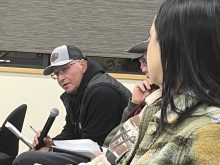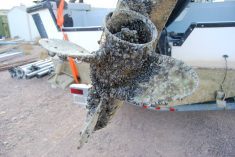A new agency to facilitate Canadian meat exports has come under fire for using federal veterinarians as negotiators, instead of seasoned trade officials.
Relying on veterinarians to negotiate market access creates “huge problems” for Canada’s beef producers still reeling from the aftereffects of BSE, according to a former Canada Beef Export Federation official.
“Why would a veterinarian be negotiating? This is what the problem was in the past,” said Scott Wooding, past chair of CBEF’s technical committee.
Read Also

Lower canola seeding rates can pay off: study
Research shows lower canola seeding rates improve emergence and root systems, boosting yields in dry years while cutting input costs.
“They don’t know anything about negotiating.”
CBEF feels CFIA has a poor record of negotiating the reopening of overseas beef markets, said Wooding.
He pointed to the fact that only 13 countries and the European Union have restored full access to Canadian beef nearly six and a half years after BSE appeared in Alberta in May 2003.
Part of the problem is that CFIA veterinarians involved in market access talks lack the authority to actually ratify trade agreements, said Wooding.
The beef industry has lobbied hard for a technical government secretariat to restore and secure access to international markets. Ottawa announced AMAS in January 2009, following recommendations from the Beef Value Chain Round Table.
AMAS’s purpose is “a whole government approach” to market access, said director-general Fred Gorrell.
“We’re developing country strategies to leverage all of the government of Canada’s assets, both at the political and nonpolitical level, to allow the technical people to sit down and actually have those agreements,” said Gorrell.
AMAS uses veterinarians, who remain CFIA employees, to provide technical background. The agency also uses officials from Agriculture and Agri-Food Canada and the Department of Foreign Affairs and International Trade for a full-court press in negotiating market access with foreign countries, Gorrell said.
The result is “a greater focus and sustained effort” with new resources to negotiate technical trade issues, he said.
Gorrell was questioned about using CFIA veterinarians in negotiations during CBEF’s recent annual meeting in Calgary.
Ted Haney, CBEF president, called AMAS “a hopeful development” and “very definitely a movement away from status quo.”
But Haney said professional trade negotiators, not technical advisors, should take the lead.
“Our preference would be for the negotiators to be the lead function with technicians – veterinary inspectors, regulators – in support, if necessary,” he said.
“It should be a fully functioning market access centre of excellence where the strategies are formed, the tactics are devised, the program is delivered and the results are brought home.”
Gorrell said that’s exactly what AMAS is doing, using a fully coordinated effort dedicated to market access.
He bristled at suggestions that CFIA has done a poor negotiating job.
“That is doing an injustice to the situation. Looking back after six and a half years and pretending that it was the ineffective job of the agency that hasn’t opened up markets, I don’t think that based on a full sense of the reality. We know much more now than we did in 2003.”
Haney insisted AMAS must move quickly to sign actual trade agreements.
“We need this group fully functional, fully engaged at all levels in order to address this absolute ongoing trade crisis that BSE is for our industry,” he said.
“It is not technical. That finished years ago.”
Haney said the industry is frustrated at the slow pace of reopening lost markets and the reluctance of some countries to comply.
A major example is South Korea, which still refuses to accept Canadian beef despite allowing beef from the United States, which also has BSE. The case is presently before the World Trade Organization.














